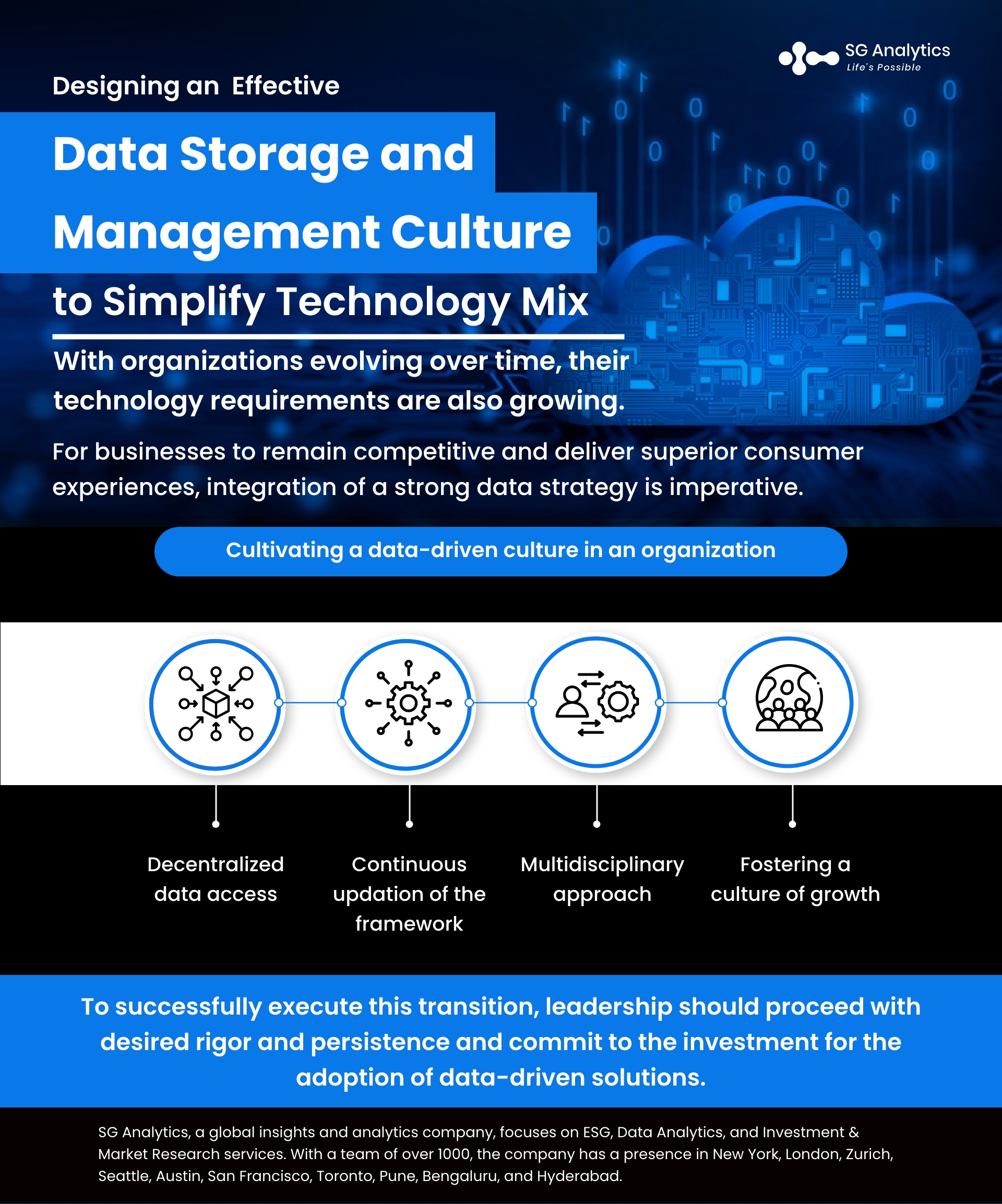In the fast-paced world, with the priorities of clients changing, the ecosystem of data storage and management is also undergoing a makeover.
With organizations evolving over time, their technology requirements are also growing. Today, data is the new currency, and organizations perceive it as an asset, not a liability. They are exploring new avenues to efficiently extract value from their data without increasing the cost as well as complexity. From the year 2020 to 2025, International Data Corporation (IDC) forecasted that new data creation to set grow at a compound annual growth rate (CAGR) of 23%. This will result in 175 ZB of data creation by 2025.
Data management teams are integrating the best components to meet their requirements, i.e., development and experimentation cycles, without losing focus on the bigger picture of introducing a viable product into the market. Every process begins by gathering volumes of data. However, in the end, it becomes difficult to optimize the accumulated data with the available toolsets. To overcome these crises, businesses are integrating data management and security platforms that are assisting them in utilizing the data better and transforming it into useful insights.
Read more: Future Of Tokenization: A Comprehensive Look at Tokenization and its Impact

Understanding the Need for a Data-driven Culture
Data-driven solutions assist organizations in delivering superior experiences by providing them with relevant and insightful information, along with the preferences of their target audiences. Amidst the growing pressures to surpass customers’ expectations, data has gained the importance of strategic prominence. Data-driven organizations can identify opportunities and capitalize on the early windows of opportunity to stay ahead of the competition. Further, data-driven cultures are instrumental in executing ground-breaking innovation.
Embarking on a journey to adopt a data-driven culture requires a clear vision and communication throughout the company across every functional department. While communicating, it is vital to emphasize that the leadership should also be on the rationale and utility of the approach. This focus on benefits for stakeholders will assist in setting the stage for a smooth transition and implementation of data-driven decision-making and dispel any misconceptions.
However, cultivating a data-driven culture in an organization is not an easy process. It’s a long journey that demands constant support and encouragement from leadership. In addition, the financial implication of integrating data-driven culture into everyday operations also must be taken into consideration. Let's explore some of the important sites to follow to achieve the desired results while fostering a data-driven culture.
-
Decentralized Data Access
Working with data silos can reduce the productivity of organizations. To foster an efficient data-driven culture, complete decentralization of data access is vital. It is the primary responsibility of the management to ensure that the provenance of the data is established and its accuracy is well-verified. Data can be further optimized to achieve desired performance based on critical parameters. The data department should also work to integrate a layered approach that does not compromise the security and confidentiality of the database.

-
Continuous Updation of Framework
In the ever-evolving business environment, it is imperative to update the database to extract relevant information for accurate decision-making. It is, therefore, vital to establish a clear and comprehensive framework to collect, store, analyze, and update the data. In addition, special focus should be given to sorting and organizing the data and making it handy.
Read more: Artificial Intelligence and the Downsides of AI Data Collection
-
Multidisciplinary Approach
The effectiveness of data-driven solutions depends on the individuals who collect, process, and analyze these solutions. It is vital to invest in upskilling as well as reskilling employees, thereby assisting them in effective decision-making and growth. Adopting a multi-disciplinary approach will help strengthen the data culture along with employees' analytical skills. This investment will enable the firm to reap the benefits of fostering a data-driven culture.
-
Cultivating a Culture of Growth
Leading a team while maintaining a data-driven culture can be daunting. However, it is possible with the right approach. By fostering a culture that values innovation and excellence, organizations can innovate new ways in everything to enhance their operations. This can help them understand operational excellence along with other critical components for creating the right environment for growth. Gaining the right understanding of the specific competitive advantage is a critical factor in preserving their culture during growth. Organizations need to identify and ensure that employees, as well as other stakeholders within the company, understand the frameworks that make them different from their competitors.

Fostering a Data Culture in a Hybrid Environment
Companies globally are facing the challenge of redefining their work guidelines and exploring ways to bring back the work pace. They are identifying a new team approach to this problem by forming a hybrid work model that balances individual requirements and the team's productivity. In a hybrid, teams can decide on ways to work together to be creative, innovative, and collaborative.
But with the ongoing innovations in the data storage industry, industry leaders are fixated on hyper-growth by fostering a culture in a hybrid data environment. This hybrid working model also allows for the apprentices, leadership, and teams to be working in the same space at the same time. Thus, fostering an environment for sharing knowledge and working together to achieve common goals.
With this instantaneous growth, the data landscape is becoming increasingly complex for organizations to manage. Modern technologies are adding up to meet the growing needs and demands of organizations. This has fragmented the data storage, and data is being stored across multiple environments, such as hybrid, cloud, as well as multi-cloud environments. This mix of technology and evolving landscape can be tackled by effective data-driven management solutions. Organizations should carefully manage the data to keep storage costs under control and drive a successful information life cycle management strategy.

Read more: Top Data Analytics Certification Programs to Explore
Simplify Data Storage for Smooth Functioning
Organizations across the globe have been tackling the complicated data storage problem. Data storage is a vital component of any organization’s infrastructure. Yet, for many, it is still a complicated and frustrating zone. One of the primary goals for organizations is to simplify the way their data storage operates. The second goal is to establish a systematic flow across data systems.
Organizations are faced with opportunities and risks. To make the best decisions possible, they need to incorporate a data culture that helps them become responsive to consumer demands. For businesses to transition toward a data-driven culture, they need to-
-
Operate with trust
-
Democratize insights
-
Increase business agility
-
Apply innovative intelligence

However, to achieve this, businesses have been focusing on eliminating the need for extensive training and complex manuals.
With the changing business landscape, building a culture where data reigns process and technology is becoming prominent. The journey begins with identifying what a data culture is and why it matters, then continuing down the path to folding data-driven decision-making into business initiatives.
Key Highlights
-
Traditional data quality tools are falling short due to the going comprehensive. For timely data quality needs, organizations need to integrate significant effort and expand their limited scope by embracing new frameworks.
-
Modern data solutions are presenting businesses with augmented data capabilities to solve data quality issues. This disruption, fueled by metadata, artificial intelligence (AI), and machine learning (ML), is presenting new practices to simplify data processes.
-
The emerging data ecosystems require data quality solutions that businesses can integrate with cohesive designs to support operational excellence as well as enhance overall financial governance.
Read more: Anatomy of Consumer Data: How is it driving Changes in Decisions for Businesses?

Final Thoughts
A data-driven culture is the need of the hour. For businesses to remain competitive and deliver superior consumer experiences, integration of a strong data strategy should be among the topmost priorities. This integration into the organization's operational framework is a lengthy process and mandates a shift in the culture and mindset. To successfully execute this transition, top organizational leadership should proceed with desired rigor and persistence and commit to the investment for the adoption of data-driven solutions. The desired results of the integration of data-driven mechanisms in decision-making can only be manifested when relevant stakeholders understand the significance of implementing a data-driven approach and follow the techniques in spirit.
With a presence in New York, San Francisco, Austin, Seattle, Toronto, London, Zurich, Pune, Bengaluru, and Hyderabad, SG Analytics, a pioneer in Research and Analytics, offers tailor-made services to enterprises worldwide.
A leader in the Technology domain, SG Analytics partners with global technology enterprises across market research and scalable analytics. Contact us today if you are in search of combining market research, analytics, and technology capabilities to design compelling business outcomes driven by technology.









